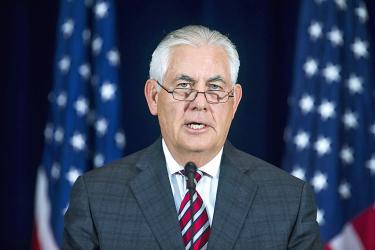US Secretary of State Rex Tillerson on Wednesday urged Chinese officials to apply greater diplomatic and economic pressure on North Korea to force it to rein in its nuclear weapons program.
Tillerson’s remarks came after he and US Secretary of Defense James Mattis met with the Chinese visitors at the US Department of State, where the former general said he saw scope for a better defense relationship.
The extent to which Beijing can influence Pyongyang is key in trying to defuse the North Korean crisis, and Tillerson’s remarks came the day after US President Donald Trump appeared to suggest Chinese President Xi Jinping (習近平) had come up short in efforts to lean on North Korean leder Kim Jong-un’s regime.
Calling North Korea the “top security threat” to the US, Tillerson said China has a “diplomatic responsibility to exert much greater economic and diplomatic pressure on the regime if they want to prevent further escalation.”
For their part, the Chinese envoys voiced their opposition to Washington’s deployment of the Terminal High Altitude Area Defense anti-missile defense system in South Korea and demanded its withdrawal, the Chinese Ministry of Foreign Affairs said in a statement.
Trump, who frequently denounced China on the campaign trail, has turned to Beijing to help pressure its ally North Korea, prompting concern among Asian partners that the US might go easy on disputes in the South China Sea, where Taiwan also has claims.
However, on Tuesday, Trump sent a tweet suggesting Xi’s efforts had not borne fruit — a message he reiterated before supporters in Iowa.
“I do like President Xi,” he told the crowd on Wednesday evening. “I wish we would have a little more help with respect to North Korea, from China. That doesn’t seem to be working.”
Tillerson said the US and Chinese officials had agreed that companies from both nations should not do business with any UN-designated North Korean entities.
Trump has made halting the North Korean nuclear threat his No. 1 foreign policy priority.
On Wednesday, the US president took the formal step of extending for another year a national emergency with respect to North Korea that was first decreed in 2008 under then-US president George W. Bush.
In a letter notifying the US Congress of the move, Trump wrote that the “existence and risk of proliferation of weapons-usable fissile material on the Korean Peninsula” together with the “provocative, destabilizing, and repressive actions” of the Pyongyang regime “continue to constitute an unusual and extraordinary threat to the national security, foreign policy, and economy of the United States.”
Last month, Beijing and Washington signed a limited deal to open new markets for each other’s exports, and a long-standing friend of the Chinese leadership, Iowa Governor Terry Branstad, was confirmed as US ambassador.
However, tensions remain — particularly over China’s building of artificial islands in the South China Sea.
“Secretary Mattis and I were clear that the US position remains unchanged,” Tillerson said.
The Chinese side defended Beijing’s “right to take measures to safeguard its territorial sovereignty” and said Washington should respect its security interests.
Source: Taipei Times - 2017/06/23





















